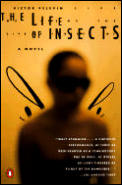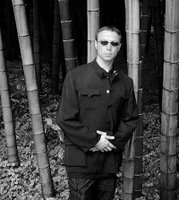
 Victor Pelevin's
Victor Pelevin's The Life of Insects
Russian author, Victor Pelevin combines several stories into a single novel, allowing, as one reviewer put it, "a picture to emerge of a society as a whole, not from the top-down as if by some Soviet-style central design, but rather from the bottom-up, where individuals live their own lives, only vaguely aware of others outside of their sphere. The Life of Insects becomes a commentary on modern Russian society, with various factions each being represented by some variety of insect, beginning with enterprising mosquitoes in a clear reference to the 'New Russians' that emerged at the collapse of the Soviet Union."
Reminiscent of Franz Kafka's The Metamorphosis, humans find themselves morphing into insects, and mysteriously acquiring insect-like instincts while retaining human thoughts and feelings. Comical, yet sad, Pelevin writes with biting satire. Basically, the author is saying that humans are complacent and accept our lives as they are, content to roll our "balls of dung" and fundamentally nothing really changes in society. As reviewer C. Matthew Curtin writes "we are shown very clearly that for whatever struggles might take place at the individual level, circumstances far beyond our control will dictate the manner of our daily lives as we hope to produce another generation of the species before we meet our own ends."
I didn't know whether to be amused or depressed. This work is very imaginative and very real at the same time. The insect-characters are very interesting and representative of the various factions of society. Beetles obsessed with rolling their own dung only to be able to pass on their ball of shit to their offspring. (Which is representative of one generation passing its problems on to the next.) Blood-sucking mosquitoes, moths who struggle against flying into the light, a pregnant female ant, an ant who decides she wants to be a fly . . . I was left a little confused about the characters and their attitudes, which is probably intentional upon the author's part.
The settings are often unclear, which is probably also what the author intended to provide a sense of uncertainty that the characters experience. Insects are always coming and going from insect world to human world. Pelevin is attempting to show how often we let our surroundings define us, thus losing sense of the individual. When our surroundings are forcibly changed for whatever reason, we often lose the sense of who we are, or realize we never really knew who we were all along.
I give this novel four starts. It's a very interesting and meaningful read, even though the idea was obviously borrowed from Kafka, which makes the story not so unique in its creation.



1 comment:
Good point Mary about the difference between this book's insects and Kafka's cockroach. Kafka's character comes to a grim ending, whereas Pelevin characters, though they may lose a sense of who they are, they are adaptable to whatever happens to them.
Post a Comment